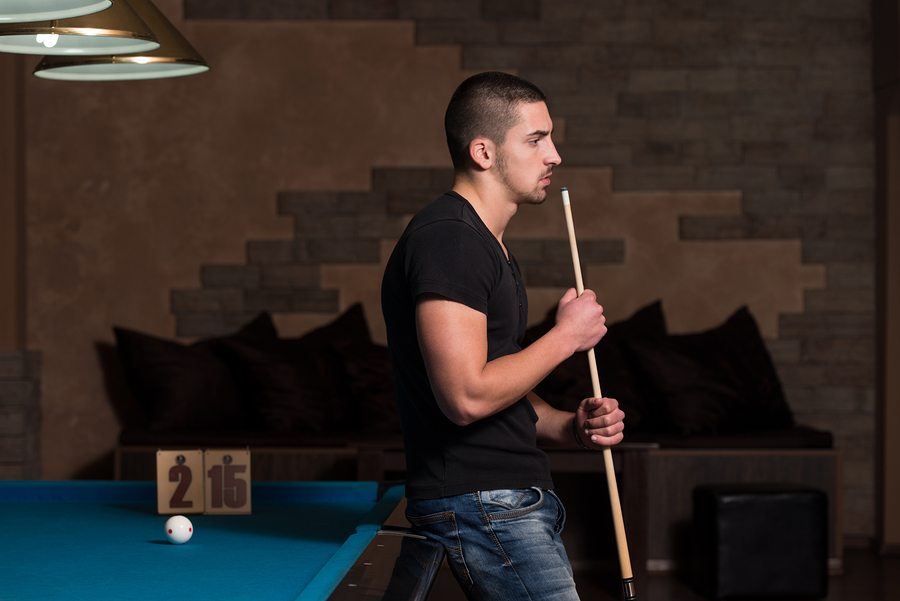Sportsmanship

Communication is Key
Good sportsmanship lies at the heart of any competitive endeavor. Pocket billiards is unique among sports in one significant aspect — players are often required to reveal their intentions before they act. For this reason, communication is critical. Not calling the pocket for a shot clearly or forgetting to call a safety has led to many unnecessary disputes in battle. While BCAPL rules are designed to reduce friction at the table, no referee or tournament director or league rep can broker the peace. That choice is shared and ultimately rests with the players.
Starting Guidelines
1. When you’re at the table, pay attention to how your shot appears. If you think there’s a chance that your opponent might not understand your intentions, then please call the shot. While a bank may be obvious to you, assume that it’s not to your opponent. If you’re kicking at a ball or banking two rails or more, then a call is necessary.
2. When you do call a shot, do so clearly. It’s preferable to face your opponent and make eye contact. If you do call a shot by gesture, make a clear and definite motion indicating both ball and pocket.
3. When you’re in the chair, you should pay attention to the game and to your opponent. Communication is a two way street. If your opponent is telling you what they intend to do, listen carefully and clearly acknowledge that you understand. If you don’t understand, get clarification. It’s recommended that you face the table and your opponent (even when you’re waiting to shoot again).
4. Don’t let personality conflicts affect your efforts at communication. It doesn’t matter how you feel about your opponent — always commit to open, civil communication during your match.
Unsportsmanslike Penalties
1-45 (AR P. 99)
Official Rulebook | 2014-16 Edition
1. You must not commit any act that is unsportsmanlike in nature. This includes, but is not limited to: actions that are embarrassing, disruptive or detrimental to other players, spectators, referees, event officials, or the sport in general, or any act that makes a travesty of the game. Offering to gamble with opponents or spectators during your match is specifically defined as unsportsmanlike conduct.
2. You’re responsible for your actions at all times while you’re present at the event venue, whether playing or not.
3. You may be penalized for unsportsmanlike conduct with or without warning. Penalties for unsportsmanlike conduct are at the discretion of the referee or other designated event officials, and may vary based upon the referee’s or event official’s judgment of the severity and nature of the unsportsmanlike act. A player’s pattern of behavior from prior events may also be considered.
4. A foul with a specified progression of penalties may have a more serious penalty applied early in the progression if it’s committed willfully or in an unsportsmanlike manner, or if it’s committed intentionally in consecutive matches.
5. Unsportsmanlike conduct warnings and penalties carry forward and are cumulative during the entire event.
6. Disqualification from any CSI event for unsportsmanlike conduct will result in forfeiture of any prize money, trophy or award won by that player or team. In addition, any championship recognition won’t be entered in the official records of the event.
Shot Clock Procedures
1-15 (Shot Clock Procedures)
Official Rulebook | 2014-16 Edition
1. There is normally no time limit for you to take a shot. However, a referee may implement a shot clock if they judge that you are delaying a match unnecessarily or in an unsportsmanlike manner, or if event officials require that a match proceed at a faster pace. (AR p. 84, 107)
2. You may call a referee if you believe your opponent is deliberately or consistently playing at an abnormally slow pace. If, after a reasonable period of observation, the referee judges that slow play is occurring, they will warn the offending player(s). After the warning, if the referee judges that the pace of play remains abnormally slow, they will place the player(s) on a 45-second shot clock.
3. Shot clock procedures are:
a. The shot clock does not apply to the first shot after the break in any game.
b. During a player’s inning, the shot clock starts when the previous shot ends and runs for 45 seconds or until cue tip to cue ball contact begins the next shot. If a player has ball in hand, the shot clock starts when the player has possession of the cue ball and any spotting of balls or racking is finished.
c. If they are not already down on the shot when ten seconds remain on the shot clock, the player will receive a ten second warning from the referee (announced as clearly as “ten”, loudly enough for the shooter to hear). If the player does not strike the cue ball within ten seconds, it is a foul. (AR
p. 85)
d. If a player is already down on the shot with ten seconds remaining, no announcement is made. The shot clock will pause at ten seconds and the player may exceed the 45-second limit provided they do not stand up off the shot. However, if the player stands up off the shot, the referee will immediately announce “ten”, and the shot clock will resume. If the player does not strike the cue ball within ten seconds, it is foul. (AR p. 85)
e. For timing purposes, “down on the shot” means the player is in a customary shooting position as it relates to their bridge hand and grip of the cue, or, if using a mechanical bridge, the bridge has been placed for the shot and the cue placed in the bridge’s groove with the player’s grip hand on the cue.
f.Each player is permitted one 45-second extension per rack. If both players are on the hill, each player is permitted two 45-second extensions. To use an extension, the player must verbally announce “extension” to the referee. The referee will then respond with “extension” or, if the player has no extension remaining, “extension not allowed”. For extensions, procedures with ten seconds remaining are the same as for other shots.
g. The shot clock will pause if play is stopped to summon a referee, and will start again when the referee authorizes the player to shoot. In a game in which a referee is presiding, the shot clock will pause if play must be delayed to allow the referee to take up a position, examine the table, or for
any other administrative stoppage. In either case (referee presiding or not), after an administrative stoppage the shot clock may, at the referee’s discretion, be reset before authorizing the player to shoot.
Concession
1-43 (Concession of Game)
Official Rulebook | 2014-16 Edition
1. You must not concede any game at any time for any reason. “Concede” means that, as a result of any verbal or non-verbal action, you lead your opponent to believe that you are awarding them the game before its normal conclusion on the table. Before a game has ended, you must refrain from making any statements such as “good game”, etc., or any other verbal inference that the game is over or that your opponent is certain or likely to win. You must also refrain from any similar non-verbal action, such as putting away your cue or accessory items, beginning to mark a score sheet, changing clothes, retrieving
or juggling coins or tokens, etc. Whether or not you have conceded a game is determined
solely by the referee’s judgment.
2. If you concede a game, in addition to losing that game you will receive a mandatory warning against further concessions. A second violation results in the loss of the conceded game and an additional deduction of one game from your score (if you have zero games, your score would be “minus one game”) and a final mandatory warning. A third violation results in loss of match. In team play, any member of the team may commit the second or third violations. (AR p. 98)
3. In the absence of any act by your opponent judged to be a concession under Rule 1-43-1, you must not assume that your opponent has conceded the game. If you disturb the position of the table in such a situation, then you are charged with a concession violation. (AR p. 98)
4. If you disturb the position of the table in an act that presumes the game is over before it is actually over, such as gathering balls together to rack the next game, you lose the game. (AR p. 98)
1-44 (Concession of Match)
Official Rulebook | 2014-16 Edition
When your opponent is on the hill, if you make a motion to unscrew your playing cue
during your opponent’s inning you lose the match. (AR p. 99)
Sharking
Gamesmanship (which includes sharking) is unsportsmanlike conduct. Punishment is determined by the referee, tournament director or league rep. NOVA BCAPL co-founder Eric S. Townsend has authored a popular book on the subject called Sharking: Don’t Get Fooled Again (audio book from Go Booklets). It includes a discussion of billiard distractions, the psychology behind it, a simple antidote, colorful stories from pool rooms and a list of shark techniques to overcome in competition. Noted billiard author Phil Capelle (A Mind for Pool, Play Your Best Pool) offers this recommendation: “Sharking is well-written, full of engaging anecdotes and is loaded with sage advice from which anyone could benefit. His three-step process is right on the money. Eric, like myself, recommends a method of quickly and efficiently putting sharking methods in their proper perspective so you can go back to what you were doing before you were disrupted.”
Pool Etiquette
Article at Inside Pool Magazine by BCA HOFer Allison Fisher
Article at How to Grow a Moustache
WikiHow on Proper Play Pool in a Bar or Tavern
Article at PoolDawg on Mind Your Sticks, Balls and Holes
Guidelines from the Professional Billiards Instructors Association
Guidelines from EnglishBilliards.org




